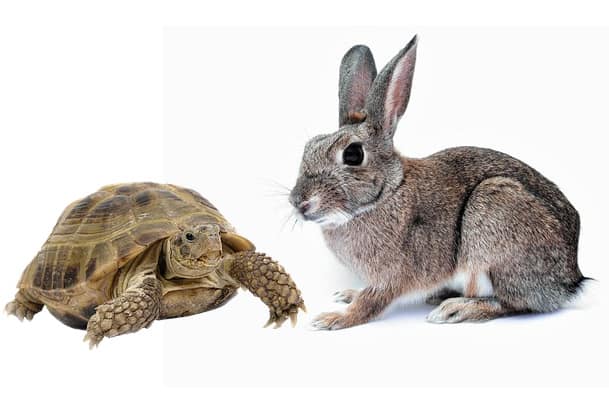
We’ve written before about keeping tortoises alongside other animals; in particular cats and dogs. Accounts on this vary, but the general consensus is that it can work, so long as said cats and dogs don’t take exception to the tortoise. It’s important to mention however that tortoises should not roam free alongside such animals inside the home.
Tortoises kept outdoors on the other hand might reasonably be expected to interact with the family dog on occasion, which might then leave you wondering whether they would be okay kept in close quarters to other smaller animals, such as in this case, a rabbit.

You would be forgiven for thinking that that if something as powerful and boisterous as a dog isn’t a threat to your tortoise then surely a rabbit would be no concern at all. However, depending on where and how long they are kept together, it may or may not be a good idea.
Dietary Differences
You see the fundamental potential risk of keeping your shelled and fluffy friends together, has less to do with the temperament of the rabbit, and more to do with their different dietary needs, and in particular what ill effects the tortoise may suffer by eating the rabbit’s food.
With the exception of tropical tortoises such as Red Foot tortoises, most other species only require very small amounts of dietary protein. If they consume too much protein it can contribute to a range of health issues from growing too quickly, to shell pyramiding. Often such issues become problematic over a very long period of time, and as such you can be tricked into believing that everything about your setup is fine, only to realise years down the line that it was anything but.
Although the old stereotype regarding rabbit food suggests that they live on a diet of lettuce and very little else, in reality shop bought rabbit pellets are often much higher in protein than anything a tortoise might eat.
Now knowing that tortoises will eat just about anything, you can see where issues arise in keeping the two animals in close quarters. Quite simply the tortoise will eat the rabbit food, and probably the rabbit droppings too. They really aren’t fussy!
Rabbits Don’t Believe in Sharing
As cute and cuddly as rabbits are, they will show little regard for the tortoise’s needs if they wind up sharing an enclosure. This is particularly problematic if your enclosure contains a lot of weeds, grasses, or perhaps other plants that you have planted yourself for the benefit of the tortoise.
Now I’ve seen my tortoise gobble up leaves at an impressive rate on several occasions, however rabbits will practically inhale vegetation at a rate that just about any tortoise would struggle to match, especially as they can cover a wider area a lot more quickly than a tortoise.
So any dreams you have of your two pets living together in a verdant paradise, might quickly be crushed!
Rabbits Like to Chew Things
Rabbit teeth, unlike our own, continue to grow throughout their lives. This means they must continually gnaw on things in order to keep them trimmed. Usually this can be anything from carrots to the legs of their hutch, but should a slow moving tortoise be nearby then, well, I’ll leave the rest to your imagination.
I would certainly rule out keeping a hatchling or juvenile with any other animal, even a larger tortoise. They are simply too fragile and vulnerable, and stand no chance of holding their own should something pick them up, chew them, or otherwise.
Cross Contamination
Rabbit food and poop might provide a tempting source of overly protein rich food for tortoises, but the poop in particular will also be rife with bacteria and other pathogens from within the rabbit’s gut. The same is true for the rabbit should they come into contact with tortoise feces.
Let’s not forget that tortoises almost always harbor salmonella, which can certainly make people very ill, so there is probably a good chance it isn’t too good for bunnies either.
It’s difficult to say how much of an issue this may or may not be, because every specimen will carry different pathogens, but it is fair to say that cross species infection can be unpredictable, ie. just because something does not make one species ill does not mean the same will be true when the pathogen makes the jump to another.
Controlled Interaction is Probably Fine
Reading everything above will probably leave you feeling like it really isn’t worth integrating your tortoise and bunny. However, I believe that a bit of ‘managed’ integration is fine.
For example during the summer months both animals can be kept outside in the same enclosure for some of the time, providing said enclosure is large enough for the two not to get in each others way too much. I’ve read several accounts of owners who even swear than both animals enjoy being in each other’s company – who knows?!
It would also be advisable to only allow the two to mix when you are around to supervise, just in case the rabbit does decide to have a chew on the tortoise!
You should also do your best to keep the rabbit’s food well out of reach of the tortoise, for example inside the rabbit hutch which the tortoise will struggle to access. And always clear up both varieties of poop as soon as it emerges.
At night the two should certainly be seperated, as you won’t have any visibility over what the tortoise is eating, and what the rabbit is chewing on, not to mention that you can’t see whether either animal is eating something they shouldn’t be.



